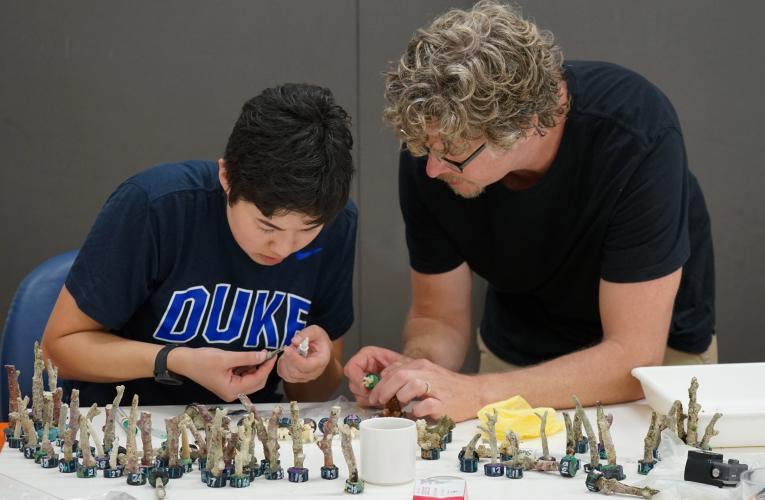Program Overview
The PhD in Marine Science & Conservation (MSC) is designed to ensure that students receive detailed training in a particular discipline of marine natural or social science, while being exposed to sufficient interdisciplinary knowledge that they are able to synthesize information from both the social and natural sciences and apply that information to policy-making. These students will be prepared for careers either in university teaching or research, or outside of the university involving the application of science to policy-making.
Doctoral students in MSC emphasize research as the major part of their degree programs. The committee, chaired by the student’s faculty advisor, will recommend which of the program’s required courses students should take along with any additional courses, and generally help to shape the student’s research program.
Faculty & Students
- Alyssa Adler
- Arona Bender
- Anjali Boyd
- Gabrielle Carmine
- Jon Choi
- Brianna Elliott
- Adrian Estrada-Graf
- Robin Fail
- Dana Grieco
- Junyao Gu
- Brandon Hays
- Rebecca Horan
- Chuxuan (Bertram) Ji
- Nicolas Jeffress
- Emma Johnson
- Nicholas (Nick) Kaney
- Chris Klein
- Xinyan Lin
- Emily Melvin
- Elisabetta Menini
- Brittney Mitchell
- Robin Newton
- TIffany Paalman
- Viola Panigada
- Madeline Paris
- Caroline Rowley
- Rafid Shidqi
Where You'll Study
The bulk of a student's time will be spent at the Duke Marine Lab in Beaufort, N.C. Doctoral students in Marine Science & Conservation typically spend one-two semesters taking graduate classes at Duke’s main campus before moving to the Duke Marine Lab to complete their research, although residence in Durham is not required. Some sources of funding are contingent upon having an advisor from the Marine Lab's resident faculty.
Requirements
The Division in Marine Science & Conservation at the Nicholas School of the Environment administers its own PhD program. All PhD students in the MSC program fulfill requirements in four areas: professional development, interdisciplinary seminar, theory and methods, and research seminars. The course work amounts to 8 graded and 2 non-graded units of study.
Please note the requirements listed immediately below apply to students who matriculated 2017 or earlier. If you matriculated 2018 onwards, please expand the section below to view requirements.
Interdisciplinary
- ENV 886A Current Topics in Marine Conservation – Second year seminar (2 units, graded)
Social Science
Choose (1):
- ENV 860SA Political Ecology (3 units, graded), or
- ENV 887A Policy Analysis of the Commons (3 units, graded)
Natural Science
Choose (1):
- ENV 876A Data and Time Series Analysis (3 units, graded), or
- BIO/ENV 773LA Marine Ecology (3 units, graded)
Professional Development
- ENV 849A. Professional Development. Alternating topics, taken twice (1 unit, P/F)
Research Seminar
- Students in years 2-4 will present a 15-minute talk on the status of their research each year. Ungraded.
Other Requirements
In addition to MSC and other course work, MSC students are required to complete a preliminary examination and complete a dissertation. The dissertation is presented in a public seminar and defended to the committee in a dissertation examination.
All students are required to serve as a TA at least once (i.e., one semester) during their PhD tenure as part of the MSC PhD training.
Students should discuss other course options and training needs with their advisor.
Please note the requirements below apply to students who matriculated 2018 onwards. If you matriculated 2017 or earlier, please refer to the section above for requirements.
Year 1
Interdisciplinary
- ENV 886 Current Topics in Marine Conservation – First year seminar (2 units, graded)
Year 2+
Interdisciplinary
- ENV 886A Current Topics in Marine Conservation – Second year seminar (2 units, graded)
Professional Development
Choose (1):
- ENV 865A College Teaching & Course Design (2 units, graded), or
- ENV849A Proposal Preparation and Evaluation (2 units, graded)
Research Seminar
- Students in years 2-4 will present a 15-minute talk on the status of their research each year. Ungraded.
Other Requirements
In addition to MSC and other course work, MSC students are required to complete a preliminary examination and complete a dissertation. The dissertation is presented in a public seminar and defended to the committee in a dissertation examination.
All students are required to serve as a TA at least once (i.e., one semester) during their PhD tenure as part of the MSC PhD training.
Students should discuss other course options and training needs with their advisor.
Admissions Criteria
Applicants to the PhD in MSC will be assessed by faculty in the Division of Marine Science and Conservation. The faculty will evaluate application materials using the criteria listed below before providing recommendations to the Graduate School of Duke University.
- Research and/or other relevant work experience, including publications
- Contribution to diversity and inclusion
- Intellectual fit
- Personal statement
- Recommendation letters
- Prior education (degrees and coursework)
- Prior academic performance
- Commitment to society
- Other
How to Apply
Before applying to the MSC Doctoral program it is critical to identify one or a few professors you would like to work with who can discuss program options and direct you to the appropriate program. No student will be admitted, no matter how good his or her credentials, unless a member of the faculty has the interest and ability to mentor (and in some cases fund) the student. For further information, contact Jim Hench, the Director of Graduate Studies (DGS), Rachel Lo Piccolo, the assistant to the Director of Graduate Studies (DGSA), or one of the professors who mentor in the MSC program.
Applications are entirely through Duke’s Graduate School. The Doctoral program application is available online.
See the Duke Graduate School and follow the links above for the specific PhD programs for details about admission and degree requirements.
For Current & Admitted Students
Please consult the Graduate School website for most information. We cannot recapitulate all of the information from the graduate school here; it is your responsibility to familiarize yourself with this website, and consult it as needed. However, some key information is listed below. We (the DGS and DGSA) are happy to help clarify any questions that arise.
The certification meeting
The certification meeting is an in-person meeting of the student and the proposed thesis committee. It should typically occur in the second year of study. The purpose of the certification meeting is to officially form the thesis committee. This meeting must occur at least 30 days prior to the prelim. Please check the Graduate School website for the specific paperwork that you need to submit and requirements for thesis committee composition; in addition, please fill out a MSC specific certification meeting form have it signed, and turn it in to the DGSA. Additional paperwork is typically required ahead of time in order to include committee members who are not full Duke faculty.
The “prelim”
The preliminary exam is an examination that lasts up to (but no more than) 3 hours and is intended to test the students’ preparation to carry out dissertation research. It should occur at the end of the second year or beginning of the third year, and must occur by the end of the 3rd year, unless an exception is requested of and granted by the Graduate School. The format of the exam varies from research group to research group within MSC, but is generally an oral examination (and written for social science track students) that includes evaluation of the students’ general intellectual preparation (ie, broad knowledge of the field of study) as well as evaluation of a written PhD research proposal sent by the student to the committee at least two weeks prior to the prelim. The prelim is conducted by the PhD thesis committee, and all committee members must be present. Note that the rules governing this exam are set by the Graduate School. After passing this exam, students are officially “PhD candidates.” Please check the Graduate School website for the specific paperwork that you need to submit. Additional paperwork is required ahead of time in order to have remote participation. A short description of the prelim is here.
Annual meetings
You should have a meeting with your thesis committee at least once per year after passing your prelim. If this does not occur, you and your advisor will need to explain why.
The defense and thesis
You are ready to defend! This should normally occur by the end of your 5th year. The defense includes a public presentation (normally no more than an hour including questions) and a closed examination, conducted by the PhD thesis committee. (note that the rules governing this exam are set by the Graduate School). Please check the Graduate School website for the specific paperwork that you need to submit.
PhD students are funded from various sources that likely will change during the course of their program. Funding sources include (and are not limited to): Research Assistantships funded by their mentor’s research funding, Teaching Assistantships, Students own research grants or fellowships or internal fellowships.
When students’ or mentors’ research or fellowship is partial and must be supplemented by NSOE, additional TA service may be required. Students in good standing and making good academic progress will have access to 5 years of funding from Duke from the date of matriculation, even if you and your advisor are unable to obtain other forms of funding (grants, fellowships, etc). However, note that obtaining outside funding during the 5 years does not extend the 5-year timeline.
Please note that additional funding is available from The Graduate School at Duke, as are other forms of support such as child care subsidies. Applying for grant is a very useful experience, and if you get one, it will be good for both you and your mentor!
Annual evaluations
Per Graduate School rules, you must fill out an annual self-evaluation at the end of the academic year. We will contact you to request this form.
Travel and conference funding
A once-a-year conference travel award is available for five years to enrolled MSC PhD students ($500 annually; contact the DGSA for details). Additionally, for students who have passed their preliminary exams, additional Graduate School travel and conference funding is available. In both cases you must apply ahead of time for the funding.
Committee travel funding
Due to our remote location of Beaufort, N.C., $750 is allotted for committee member travel for each student’s preliminary and defense exams.








